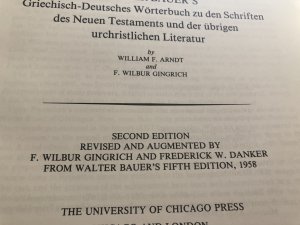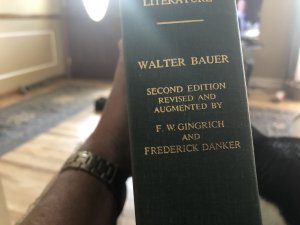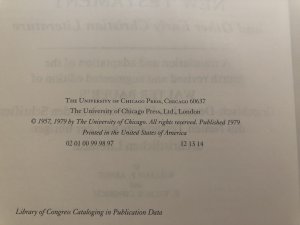Okay, fair enough, here is my point(s) regarding arneomai:
1) It is the same definition in both BAGD and BDAG so there is no ploy to change anything from one edition to the other
You need to get over this. I never did that. As you already know.
2) Your assertion, if I am remembering correctly, is that denying pertains to the "reign with him". But this is not in keeping with the text formatting. The formatting of this "trustworthy saying" are two sets of couplets
If we died with him,
we will also live with him;
if we endure,
we will also reign with him.
(and)
If we disown him,
he will also disown us;
if we are faithless,
he remains faithful, for he cannot disown himself.
How interesting. The very couplets PROVE (at least clearly demonstrate) that v.12a and v.12b are directly related to each other.
To "reign with Him" is clearly linked to behavior; that being, enduring. That requires a LIFESTYLE. Not a single action or thought.
If you think every believer will 'reign with Him', you are denying ALL the verses that plainly say that God REWARDS faithful lifestyles.
Thus, the disowning is not intended to be related to the reigning.
It is, but you are clearly in denial.
But further, the best translation is "denied", not "disowned".
Moreover, that which is disowned is a person, either God or the one who disowned God. It is not the "reward" of reigning that is implied, at least not directly.
According to my lexicon for the Greek word, is:
to deny, disclaim, disown, to renounce, to to decline, refuse, absolut. to deny contradict.
There you have it. And you are clinging to only 1 word in the range of meanings.
btw, to "reign with Him" IS a kind of ownership. Like an inheritance. Once given, the inheritor owns what has been given in the inheritance.
If a relative dies and you receive an inheritance, to whom does it NOW belong to? You, of course. You become the OWNER of that inheritance.
While I suspect that you will deny the relationship between "reigning with Christ" and that being an inheritance, but the verse parallels Romans 8:17b.
Rom 8:17 -
Now if we are children, then we are heirs—heirs of God and
co-heirs with Christ, if indeed we share in his sufferings in order that we may also share in his glory.
There are 2 inheritances mentioned here.
The red words are the guaranteed inheritance of God's children, which is to live with God in heaven.
The blue words is the inheritance that is conditioned upon "sharing in Christ's sufferings" in order to "share in His glory". And I emphasized the condition by the words "IF indeed". To show that "sharing in Christ's glory" IS a condition that must be earned by "sharing in Christ's suffering".
Do you want to argue that "enduring (in the faith)" isn't related or the same as "sharing in His suffering"?
I expect you'll deny any connection, of course. But it's there, nonetheless.
Only those believers who endure or share in Christ's sufferings will reign with Him or share in His glory.
How can "reigning with Him" NOT be the same thing as "sharing in His glory"? Of course that's the same thing! It is more than obvious.
But any talk of rewards or loss of rewards refutes the Arminian's claim that salvation can be lost.
The first couplet is stated positively the second negatively. If we endure we will reign with him, but if we deny him, we are not enduring and therefore will not reign with him. But the denial itself is focused on God himself or man himself (ἡμᾶς), not on peripheral elements directly.
This doesn't make any sense. What do you mean by the "denial itself is focused on God Himself? Of course the denial is focused or directed to the one who DOESN'T ENDURE.
3) God faithfulness is to himself, and thus, to his promises, both positive and negative. Thus, if we endure we will gain the crown of life (James 1:12, 1Peter 5:4, 1 Cor 9:25, Rev 3:11) and rule with him, as God has promised, or, as God has also promised, that after being repudiated/disowned by man he will repudiate, deny anyone who has denied him!
True words, but you still don't understand any of them. You equate "enduring" as being saved and going to heaven, and being "denied" as losing salvation and going to hell.
2 Tim 2:12 is clearly about reward for enduring and denial of reward for not enduring.
Just as Romans 8:17b is about the same thing. Those who want to "share in His glory" which obviousy refers to Christ reigning in His kingdom during the Millennial Reign, must also "share in His sufferings", which is the SAME THING as enduring in the faith.
Denial of this is simply denial of the truth.
I have never met an Arminian who understood the doctrine of eternal rewards.



